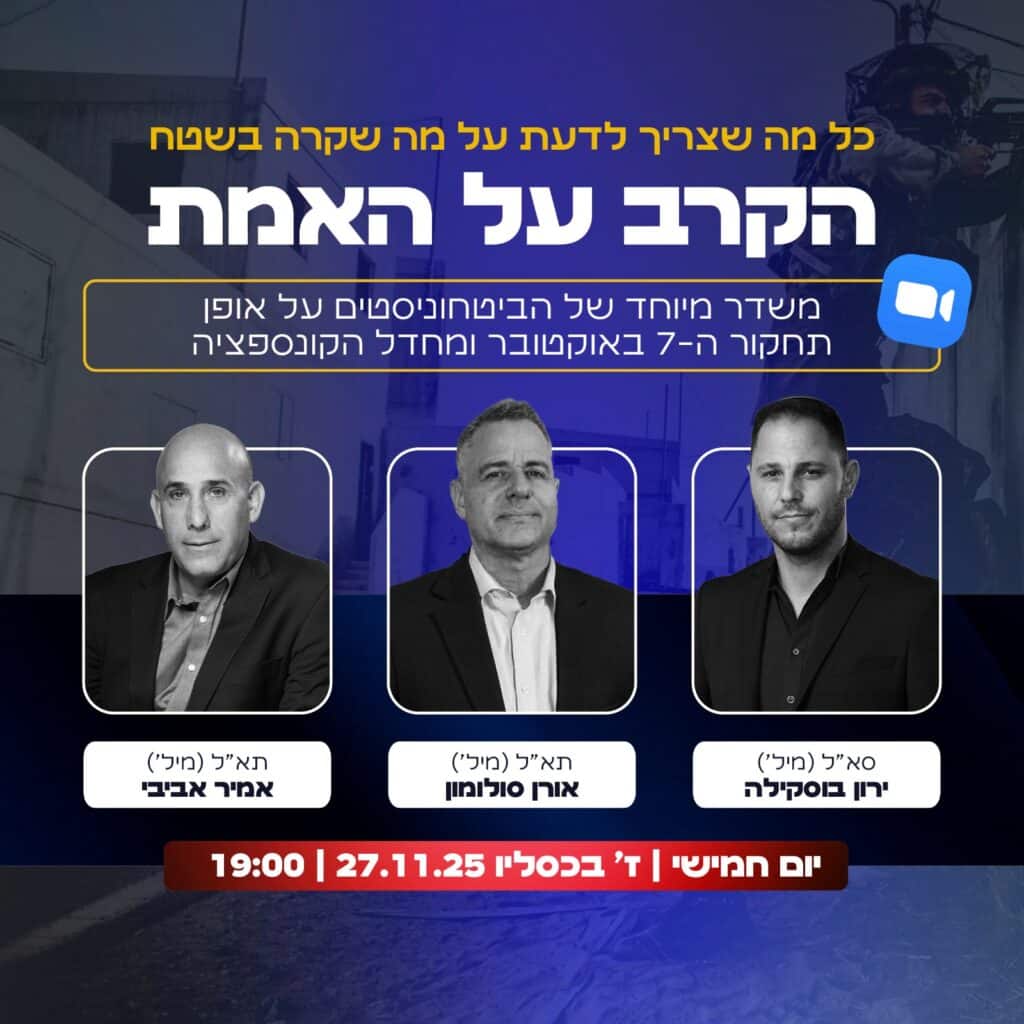The international community gives its acquiescence to Iran as a nuclear threshold state by means of informal understandings * Hezbollah ramps up its aggressive rhetoric * Tightening coordination within the members of Iranian-led “Jerusalem Axis” * Terrorism in Judea and Samaria challenges both Israeli civilians and security forces
Iran: Informal understandings substitute an unlikely renewed Nuclear Deal (JCPOA)
- August has seen no change in Iran’s continuing efforts to consolidate its regional and international power, alongside the buildup of its nuclear and military capabilities, while at the same time negotiating with significant success its internal conflicts and economic obstacles. At the forefront of its successes are Tehran’s agreement with the US on the release of 5 wrongfully imprisoned American citizens, in return for the release of several Iranians imprisoned in the US and the unfreezing and transferring of 6 billion dollars from Korea to Iran. In reality, the money transferred to Iran amounted to more than that sum as the US consented to the transfer of several billions from Iraq to Iran as well. The money from South Korea was ostensibly earmarked for humanitarian uses, but they undoubtedly will be funneled to boost the radical regime’s power not only within the country but also in the region by way of aid to its proxies in the Middle East, which pose a direct threat to the State of Israel.
- This agreement with the US is in all probability another piece of the nuclear talks puzzle, in which the US is holding back on putting pressure on Iran in the form of tighter sanctions or threats aiming to deter Tehran from enriching uranium to a military grade. This in return for a nonformal agreement on part of Iran to put the breaks on its military-grade enrichment and shift down its enrichment of Uranium to a 60% level. In this context, it would seem that the US has decided not to encourage the western European countries associated with the Joint Comprehensive Plan of Action (JCPOA) to reinstate sanctions against Iran under the snapback mechanism, or to prevent the lifting of the UN’s ballistic missile sanctions due on October 18. In return, Iran has slowed down its production of 60% enriched Uranium, notwithstanding the fact that it had already amassed over 121 kilograms of enriched Uranium at that level, which allows it to obtain enough military-grade Uranium for at least 3 nuclear warheads within a matter of weeks.
- At the same time, Iran had accelerated its production of 20% enriched Uranium, presently stockpiling over 535 kg of the matter, which, if necessary, it could easily and swiftly further enrich to a military grade with the use of the state-of-the-art centrifuges it operates.
- Consequentially, Iran was able to gain an informal agreement and broad international acceptance of its status as a nuclear threshold state, in return for it agreeing to freeze, for the time being, its activity towards military nuclear capabilities – which it is doing anyhow, due to its concerns over a military strike on part of Israel or the US in the interim period between breakout to such capabilities and obtaining a bona fide nuclear weapon, and due to the fact that the current state of affairs is favorably playing out to establish its status as a regional power.
- Now Tehran’s focal point of nuclear activity become not the continued amassing of high-level enriched Uranium, but the creation of the conditions that will allow it, when the time comes, to swiftly weaponize the enriched Uranium with the warheads of the ballistic missiles it already has.
Iran’s regional status
- With regard to Iran’s endeavors to strengthen its regional power and increase its pressure on Israel, most prominent in August were its attempts to smuggle arms into Israel’s Judea and Samaria region, for the use of its affiliated terror organization, to which it provides aid – predominantly PIJ and Hamas – thereby encouraging them to step up their terrorist activity against Israel. Also in August, Iran has accelerated its involvement in the consolidation of the relations between its proxy in Lebanon, the Hezbollah, and these organizations. For this purpose, senior officials in Tehran, among then the Foreign Minister and commander of the IRGC’s Quds Force visited Syria and Lebanon in August, where they met with the heads of the organizations.
- Furthermore, Iran is continuing its active foreign policy to strengthen its ties with China and Russia, providing the latter with weapons for its war in Ukraine. Tehran is also looking to tighten relations with Middle East countries such as KSA, and extend its diplomatic reach to other countries outside the region in South America and Africa. Its most prominent achievement in August in that context was the invitation it received to participate in the BRICS (Brazil, Russia, India, China and South Africa), held in at the second half of August in South Africa.
- However, Iran is still contending internal civil unrest, which is expected to further ignite later this month with the first anniversary of the death of Mahsa Amini, which led to the Hijab Protests. Tehran is already preparing to crush any demonstration of solidarity with the protest.
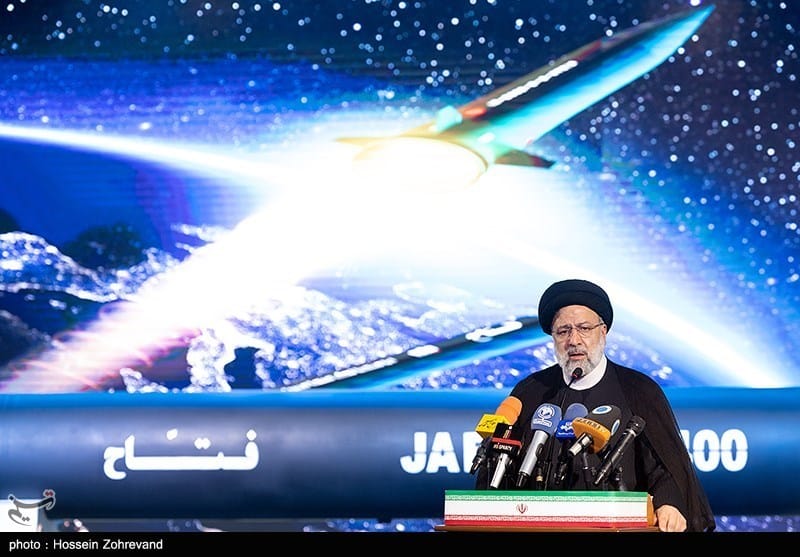
Hezbollah and Hamas: Strengthening the Iranian-led “Jerusalem Axis”
- Iran is tightening the cooperation between Hezbollah and Hamas, as can be seen by the Megiddo attack and Hamas vice-chief Saleh Al-Aruri’s statements, as well as by meetings between all the organizations of the ‘Jerusalem Axis’, an alliance of Iranian-backed terror groups. Members of this axis are Hezbollah, the Hamas force in the refugee camps in southern Lebanon (led by Al-Aruri), the pro-Iranian militias in Syria and Iraq, and the Houthi militias of the “Ansar Allah” organization in Yemen. However, the relations between the two proxy organizations are extremely complicated and encompassed major ups and downs in the past.
Gallant and Nasrallah’s exchange of rhetorical slams
- During a visit to Mount Dov, the Israeli Minster of Defense, Yoav Gallant, warned Hassan Nasrallah and Hezbollah “not to not make a mistake”, given the organization’s past mistakes and subsequent heavy price. Gallant pointed out that if the current tensions would lead to escalation and war – Israel will return Lebanon “to the Stone Age”.
- Following that, Hezbollah Secretary General Hassan Nasrallah responded that his organization can also return Israel to the Stone Age. Nasrallah argued that if a war breaks out against the entire “axis of resistance”, “there will be no such thing left called Israel”. He addressed this as part of his speech marking the “Victory Day in the Tammuz War” (Second Lebanon War). In his speech, Nasrallah tried to justify the results of the war and even tried to attribute the gas and oil exploration to that.
- Nasrallah claimed that the IDF is in the worst situation it has ever been in. By giving these speeches, Nasrallah is trying to gain the support of the Lebanese public, which disapproves and expresses deep criticism against Hezbollah that crumbles Lebanese resilience, economy and society. He tries to highlight Hezbollah’s vitality when pointing out that the ‘resistance’ achieved the retreat in the Israeli position that led to the maritime border agreement.
Notable provocative incidents initiated by Hezbollah in the northern border also occurred in the month of August.
- As part of the current tensions along the northern border, there were few incidents which indicate Hezbollah attempts to test Israel’s response:
- On August 12, a march of dozens of female students from Hezbollah’s schools was held near the border in the Metula area, to mark the 17th anniversary of the Second Lebanon War.
- On August 13, a Hezbollah operative threw a Molotov cocktail from Lebanon into Israeli territory in the Metula area. There were no casualties.
- On August 19, in the Israeli- Lebanese border area, near Metula two power cables were cut and an explosive device was attached to the security fence between Israel and Lebanon.
- On August 20, 10 Lebanese youths, apparently sent by Hezbollah, clashed with UNIFIL patrolling soldiers in the al-Khyam area, north of Metula.
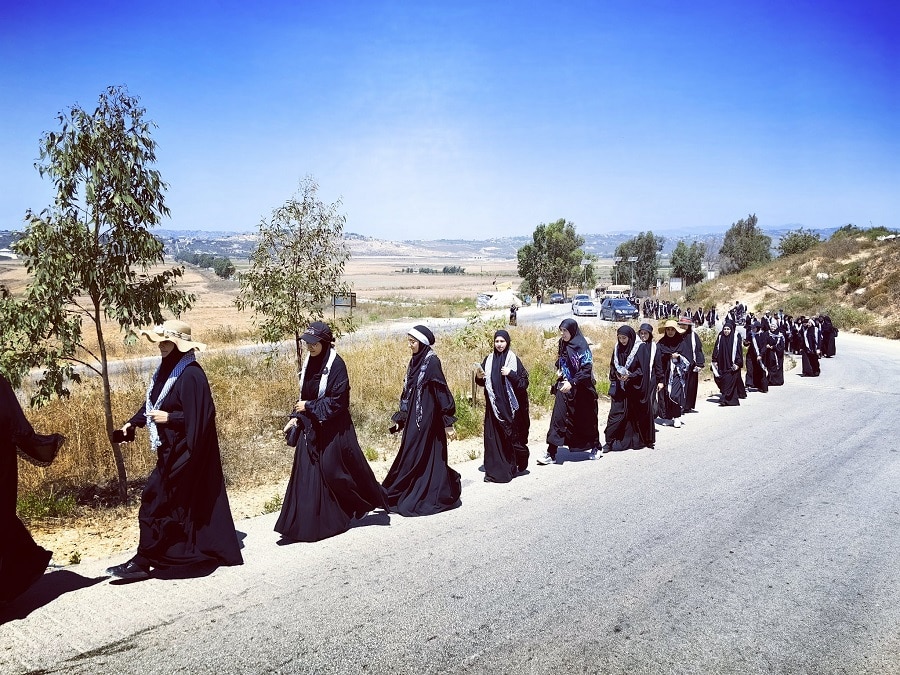
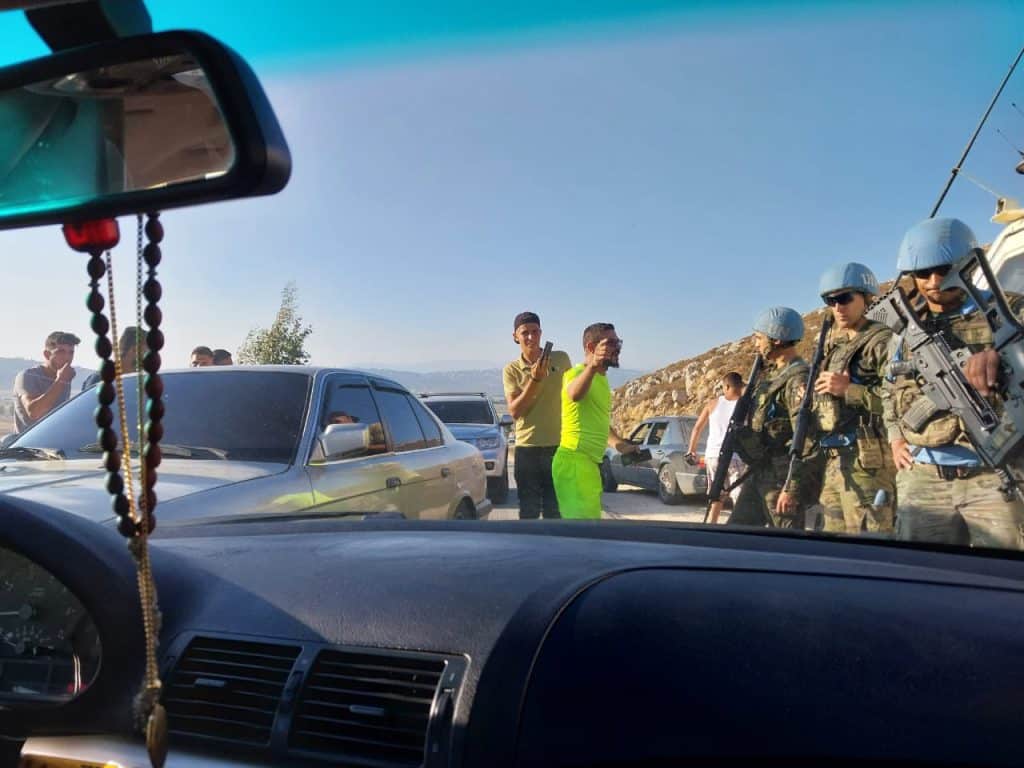
The US sanctions the fraudulent “Green Without Borders” organization
- The US Treasury imposed sanctions on the “Green Without Borders” organization, which is linked to Hezbollah and operates on its behalf in southern Lebanon. According to the announcement of the US Treasury Department, the organization “Green Without Borders” is an organization based in Lebanon, which in the last decade provided cover for Hezbollah’s operations along the “blue line” between Lebanon and Israel, under the guise of environmental activism. It was also noted that Hezbollah established dozens of positions along the border with Israel, under the organization’s cover – thereby preventing UNIFIL from carrying out its inspection work – a fact that constitutes a violation of UN Resolution 1701.
Naim Qassem’s remarks: Hezbollah is not interested in war
- Hezbollah’s Deputy Secretary General, Naim Qassem, referred to the tents that the organization set up in the Mount Dov area, inside Israeli territory, and emphasized that the two sides are not interested in war. According to him, Hezbollah has noticed that Israel is avoiding frictions, due to fear that they will lead to war. Qassem noted that the very fact that Israel is ready for war, and has not attacked for 17 years, proves that it is not interested in it. However, if Hezbollah will be forced to fight it will do so “quickly and effectively.”
- Although Hezbollah is aware to Israel’s readiness, according to Qassem’s words, the terrorist organization continues to test the Israeli response to its statements and provocations on the northern border.
Smuggling weapons to Lebanon: Hezbollah controls the Beirut airport
- Al-Hadath channel reported that Hezbollah has full control over Al-Hariri International Airport in Beirut. according to the channel inquiry, Hezbollah’s control allows landing for Iranian planes smuggling weapons to Lebanon. There are about three Iranian airlines operating in Lebanon, and all of them work with the Quds Force unit of the Revolutionary Guards: Mahan Air, Iran Air and Meraj. Al-Hadath channel’s sources stated that the Lebanese Customs Authority is aware of this smuggling and even receives residuals on every smuggling.
- On August 9, a Hezbollah truck, apparently carrying weapons, overturned when making a turn in southern Lebanon in a Christian-majority town of Kahaleh, on the highway that links Beirut to the eastern Baqaa Valley. Two were killed. Local residents surrounded the truck, seemingly aware of its content, and an exchange of fire followed suit. This illustrates how Hezbollah keeps arming itself, remaining the only militant group in Lebanon outside the Lebanese army still to keep its arms.
- Israel has also been accused of carrying out airstrikes against Iranian targets in Syria, this month as has been commonly reported since 2011. Among other incidents, a target in the Aleppo airport containing sensitive Iranian military equipment was attacked, alongside in airports around Damascus and Al-Kiswah, and a silo in the nearby area of Damascus reportedly attacked by a ground-to-ground missile and containing weapons belonging to Hezbollah. Israel declined to comment on all reports.
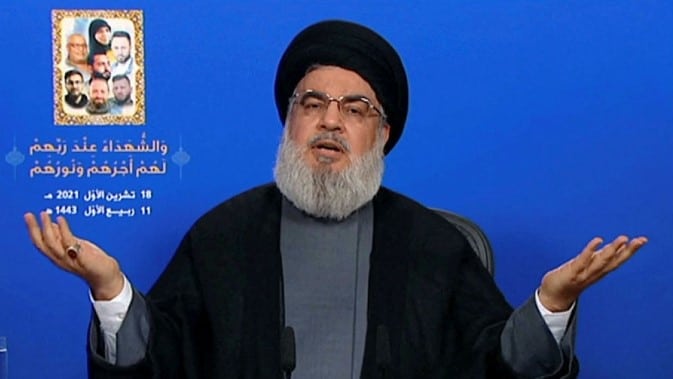
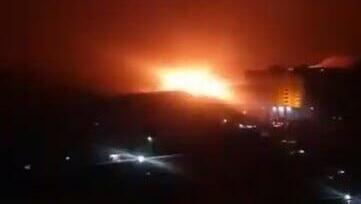
Hezbollah and UNIFIL: UN Security Council renews UNIFIL’s mandate in a language that Hezbollah opposed
- Following the pressure exerted by the Minister of Defense, Yoav Galant, the UN Security Council renewed UNIFIL’s mandate, so that it will not have to coordinate its operations with the Lebanese army and will maintain the independence of its activities. This is as opposed to the demand of Hezbollah vis-a-vis the Lebanese government, which could have restricted UNIFIL’s actions in the region.
- The Minister of Defense discussed with the Secretary General of the United Nations, Antonio Guterres, the series of threats that destabilize the Middle East: Iran’s actions against Israel through funding and arming Hezbollah, the actions of Hamas and other terrorist organizations in the Gaza Strip and Judea and Samaria. The issue of UNIFIL’s mandate arose in the context of Hezbollah’s flagrant violations during the past year along the northern border and the attempted attack in Megiddo.
Hamas’ Saleh al-Arouri statements on Israeli counterterrorism crackdowns
- Following the severe terrorist attacks in Judea and Samaria, Israel decided to “hit the terrorists and their messengers”. Following that, there is increasing concern among the Palestinian terrorist organizations about Israel’s return to the policy of targeted thwarting, and they have warned of a serious escalation in the field. One of the top terrorists that may be in Israel’s sights is senior Hamas official Saleh Al-Arouri, the deputy head of the organization’s political bureau and the head of its military wing in Judea and Samaria – who is considered to be the one who pulls the strings when it comes to Hamas activities in Judea and Samaria.
- In what can be interpreted as his fear, al-Arouri was interviewed recently, and threatened a harsh response if Israel tries to assassinate the leaders of the terrorist organizations. “There are those in Israel who want a regional war, and there are those who are thinking about steps that will lead to it”.
- Al-Aruri promised to continue promoting terrorist attacks against Israelis in Judea and Samaria. He added that “immediate preparation and implementation of terrorist attacks is the best option. The best and most useful model we have in the West Bank is the direct and immediate confrontation with the settlers and the army”.
- Despite Al-Aruri’s statements, it seems that behind his words there is a fear of a possible assassination. Al-Aruri’s activity led to severe terror attacks in which 35 Israelis were murdered since the beginning of the year, and more than 480 significant attacks were foiled, of which about 400 were shooting attacks.
The Prospects of Israeli-Saudi normalization
- Israel’s pledge to normalize its relations with Saudi Arabia have made prudent strides throughout the month of August. The Biden administration’s commitment and determination to broker this deal has led to a series of meetings, during which the American representatives have attempted to bridge the gaps and conclude an agreement. WSJ reported that Saudi Arabia has made the decision to normalize its ties with Israel within 9-12 months, although intricate negotiations remain far from conclusion.
- Israeli officials have made several noteworthy statements regarding the process. MK Yuli Edelstein, who chairs the Knesset’s powerful Foreign Affairs and Defense Committee, gave a telling hint during the IDSF-Habithonistim and JCPA “Oslo Accords At 30” conference regarding some of the stumbling blocks in the negotiations, in a way that could be interpreted as if the Saudis care less about the Palestinian cause and more about civilian nuclear power:
- “Had clauses of the agreement as reported in the foreign press been reported, and I would have been asked what concerns me the most, I’m not sure the ones that relate to Judea and Samaria would concern me. There are much more sensitive clauses than reported in the foreign press. The agreement is one of formidable importance, but I attribute a great deal of importance to cost vs benefit considerations as well, alongside the need to preserve the strategic state of affairs in the Middle East.”
- Israeli Prime Minister Benjamin Netanyahu has made similar comments about the relatively marginal importance of the Palestinian issue in the eyes of the Saudis in an interview to Bloomberg News: “I think the Palestinian thing is brought in all the time, and it’s sort of a check box. You have to check it to say that you’re doing it.”
- A Palestinian delegation headed by senior PA official Hussein A-Sheikh is expected in KSA to discuss the prospects of normalization. WSJ reports, according to which Saudi has pledged to resume its funding of the PA in return for the latter’s acquiescence to Israeli-Saudi normalization have been denied by the Palestinians.
- According to an Axios report, US officials stressed to Strategic Affairs Minister Ron Dermer during a recent visit that Israel will have to make far-reaching concessions to the Palestinians to secure a normalization agreement. Reportedly, US Secretary of State Anthony Blinken told Minister Dermer that Israel is “misreading the situation” if it does not believe significant gestures to the Palestinians are necessary to assuage the Saudis.
- However, the civilian nuclear power remains front and center in the US-Saudi talks. The Saudis are also believed to be demanding real US security guarantees as well as large-scale provision of advance military and defense technologies and systems. From its side of the bargain, the US is expecting Riyadh to substantially cut back its relations with Russia and China and make gestures in terms of the war in Yemen.
Parallel normalization efforts with Libya and Indonesia: popular opinion in the Arab World remains hostile to Israel
- The Israeli foreign minister’s meeting with his Libyan counterpart: According to confirmed reports, Israeli Foreign Minister Eli Cohen has met his Libyan counterpart Najla El Mangoush as part of a meeting in Italy, which reportedly dealt with possible normalization and the preservation of Jewish Libyan heritage. Uproar and anger in Libya, including the burning of Israel flags, incitement on social media and senior parliament members calling the act “a great betrayal” have led to the Libyan Prime Minister Abdul Hamid Dbeibeh’s decision to sack El Mangoush. She was forced to flee Libya to Turkey following threats to her life and real concerns to her safety.
- The meeting was intended to be informal and strictly confidential, yet leaked to the press, which also raised questions in Israel. In response to the leak, Prime Minister Netanyahu ordered all publications of sensitive meetings to be approved by his office first.
- The prospect of Israeli-Indonesian normalization: Ynet News reported that behind the scenes, talks regarding a possible Israeli-Indonesian normalization are being held, although the Indonesians are hesitant and reluctant to move any further before Israel normalizes its ties with Saudi Arabia. The February 2024 presidential and parliamentarian election in Indonesia are expected to determine the direction in which Indonesia will chose with respect to normalization. Indonesian authorities remain concerned about the response in the street to such a move. Indonesia remains hostile to Israel, and do not allow Israelis with no foreign passport to enter the country. Burning of Israel flags is not a rare scene in the country’s streets. Recently, it has not allowed Israel’s junior team to participate in the Mundialito games, followed by its sanctioning by FIFA and the hosting of the games was moved to Argentina. ANOC World Beach games, that were supposed to be held in Indonesia, were also moved due to Bali’s refusal to allow Israeli athletes in the country.
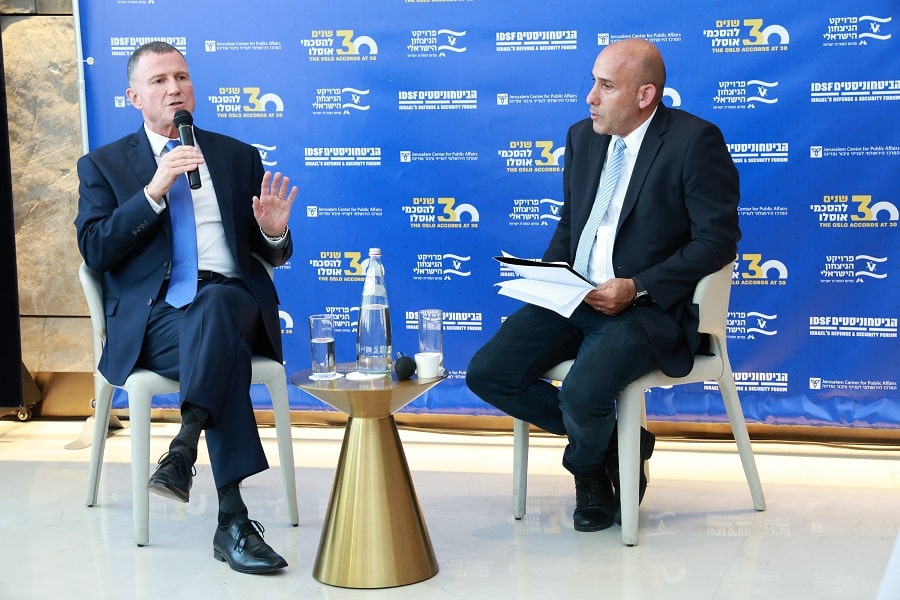
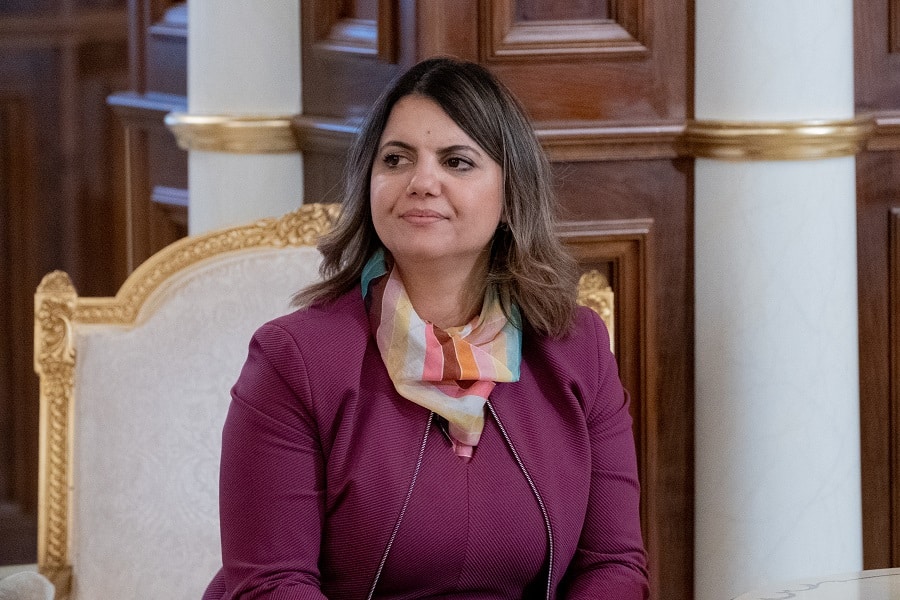
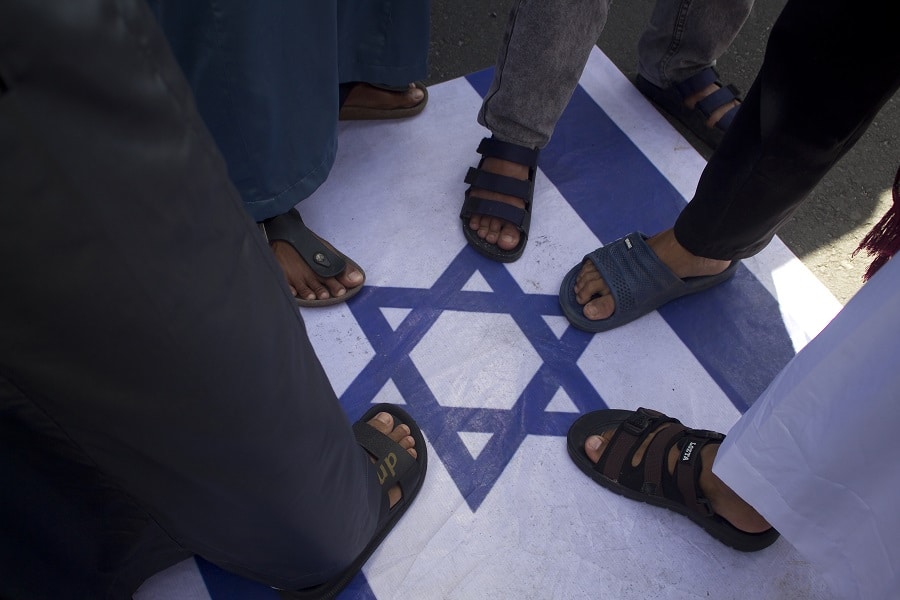
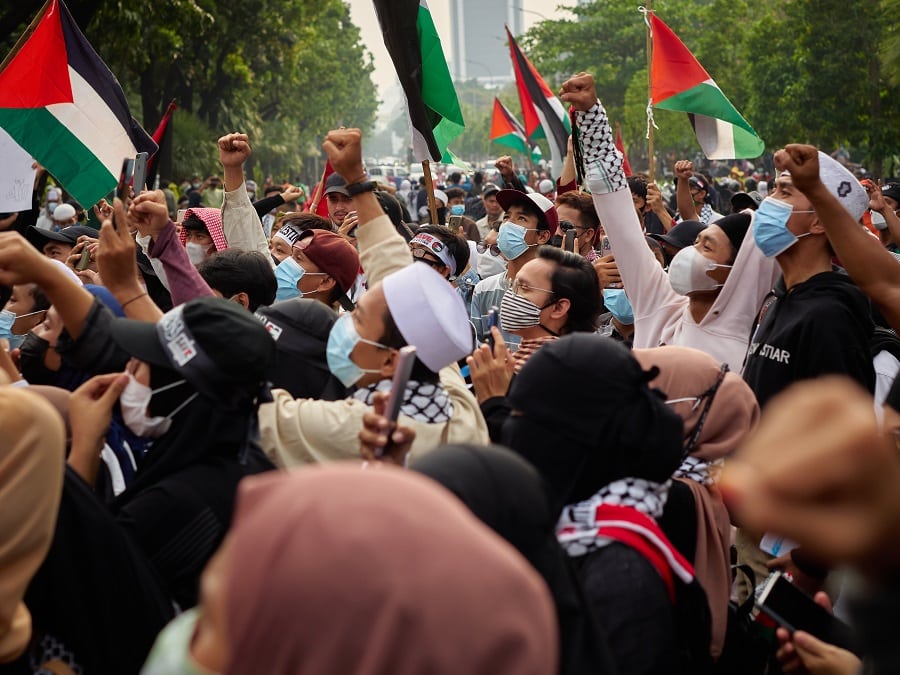
The Monitor August 2023 in numbers
Judea and Samaria
Palestinian casualties
Aug. 1 – 1 casualty, Ma’aleh Adumim, during terrorist attack on IDF soldiers
Aug. 1 -1 casualty, outside Hebron, shot by IDF soldiers upon attempting assault with knife
Aug. 4 – 1 casualty , Molotov cocktail assault against IDF soldiers
Aug. 5 – 1 casualty – Tel-Aviv, during shooting attack on municipal patrolmen
Aug. 6 – 3 casualties (terrorist squad), Jenin, IDF counterterrorism raid
Aug. 7 – 1 casualty, outside Ramallah, during attempted attack on a Jewish settlement
Aug. 8 – 1 casualty, Nablus, during fire exchange with IDF
Aug. 11 – 1 casualty, Tulkarm, during fire exchange with IDF
Aug. 15 – 2 casualties, Jericho, during fire exchanges with IDF
Aug. 17 – 1 casualty, Jenin, during violent confrontations of militants with IDF
19 Aug. – 1 casualty, Joseph’s Tomb, Nablus, during confrontations with IDF
Aug. 22 – 1 casualty, Jenin, during IED attack against IDF soldiers
Aug 30. – 1 casualty, Jerusalem, in attempt to stab passengers in light rail
Aug 31. – 1 casualty, Maccabim checkpoint, attempted car ramming into IDF soldiers
Total number of casualties – 17
Jewish terror victims
Aug. 1 – 6 casualties , Ma’aleh Adumim, terrorist attack
Aug. 5- 1 casualty, Tel-Aviv, shooting attack on municipal patrolmen
Aug 19. – 2 casualties – Hawara, terrorist attack
Aug. 20 – 1 casualty, 1 wounded, south Hebron, assassination by Palestinian
Aug. 31 – 1 casualty, 3 wounded, Maccabim checkpoint, car ramming attack
Total number of casualties – 5. Total number of wounded – 10
IDF counterterrorism activity
Aug. 10 | Zawata
In the early morning of August 10, IDF troops entered the city of Nablus in a planned counterterrorism raid to arrest confirmed Palestinian terrorists. During the raid, groups of Palestinian combatants began firing at the security forces, which had to respond with live fire to protect themselves. During the retaliation, Israeli security forces wounded the leader of the terrorist activity arm in Nablus – Al Ein, who later died of his wounds. During the raid, the security forces were able to detain a Palestinian man, who was instrumental in the planning and execution of a number of terror attack against Israeli civilians. The arrest was conducted without significant harm to the target, despite the heavy cross fire.
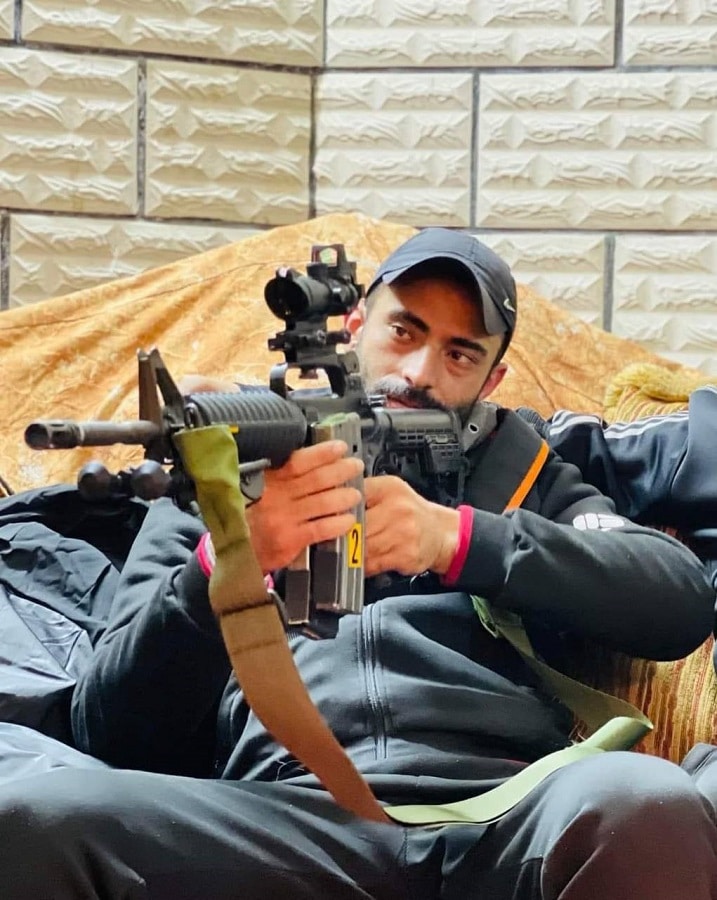
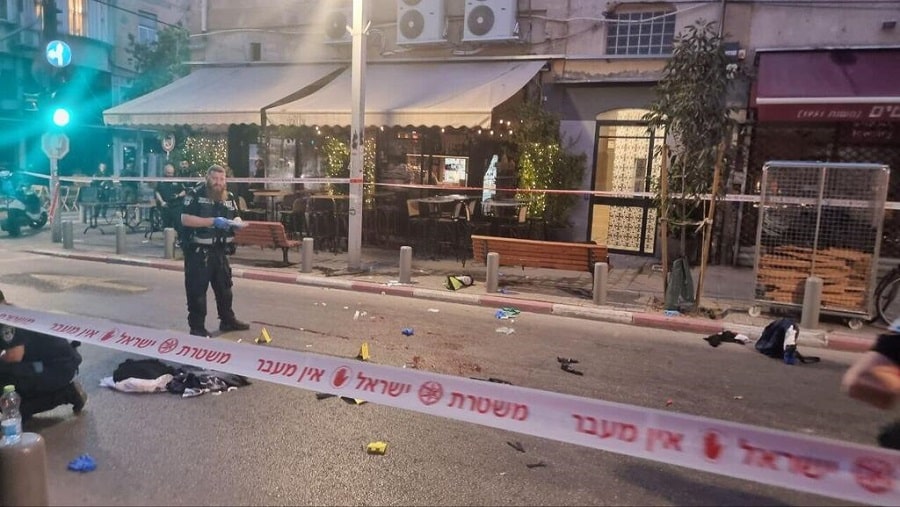
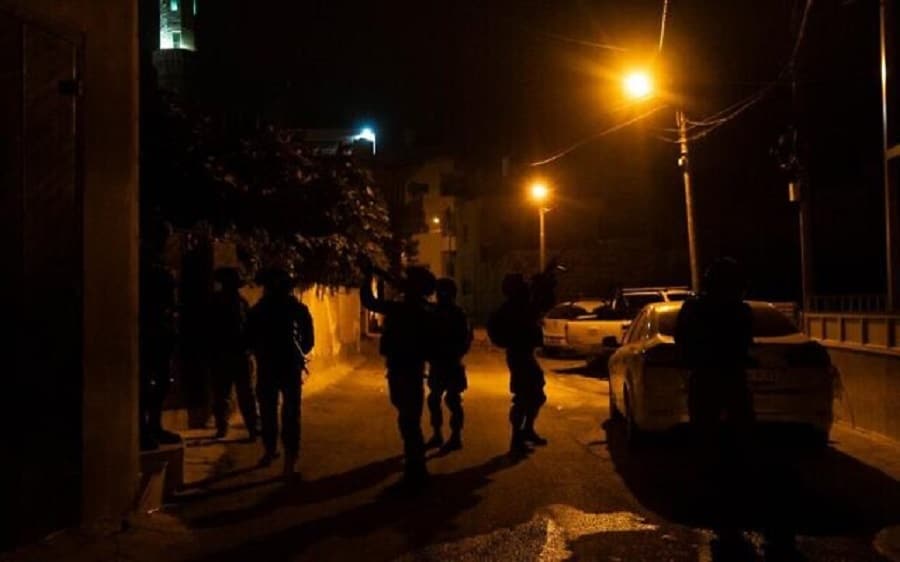
Aug. 15 | Jericho
Early Tuesday morning, August 15, Israeli Border Patrol forces entered Aqbat Jaber in Jericho in order to arrest a wanted Palestinian terrorist and search his residence for weapons. Upon entering the city, the security forces were met with live fire from armed Palestinian militants, forcing them to retaliate with live fire. As a result, the Israeli security forces wounded two Palestinian terrorists, who later died of their wounds.
August 17| Jenin
Early Thursday morning, August 17, during a joint operation of the IDF, Border Patrol and GSS, Israeli security forces entered Jenin to arrest a confirmed Palestinian terrorist squad responsible for a series of terrorist attack in Israel. They were met with live fire from the squad members, but regardless were able to apprehend most of the terrorist squad members alive and bring them to detention in Israel, with only one member severely wounded as a result of security forces’ retaliation, who later died of his wounds.
Terror attacks against Jews
August 5 | Tel Aviv terror shooting attack
Early evening on Saturday, August 5, a young Palestinian resident of Jenin opened fire on a two-man municipal patrol team. The patrolmen approached the man, requesting he present his identification card and in response he fired at them, hitting one in the head. The wounded patrolman later died of his wounds. His team member was able to neutralize the terrorist. Later investigations found that the Palestinian was a member of the military arm of the Palestinian Islamic Jihad.
August 19 | terror attack/assassination in Hawara
On Saturday, August 10, a young Palestinian male fired from close range at two Israel in the village of Hawara. The father and son had arrived at the village to get their car washed and were sitting outside the carwash when an armed Palestinian man approached them and fired and them. A later investigation revealed that prior to the shooting, the terrorist enquired whether the two were Jews, after which he approached them with a pistol, discharging several shots at point-blank to confirm the kill.
August 21 | terror attack/assassination in Mount Hebron
On the morning of August 21, a vehicle with two Palestinians opened fire towards another vehicle. The vehicle was occupied by a Jewish couple and their infant daughter. The mother was killed instantly and the father was severely wounded. The infant was unharmed. After the attack, the PIJ stated: “We commend this heroic shooting attack against a vehicle of criminal settlers from southern Hebron”.

